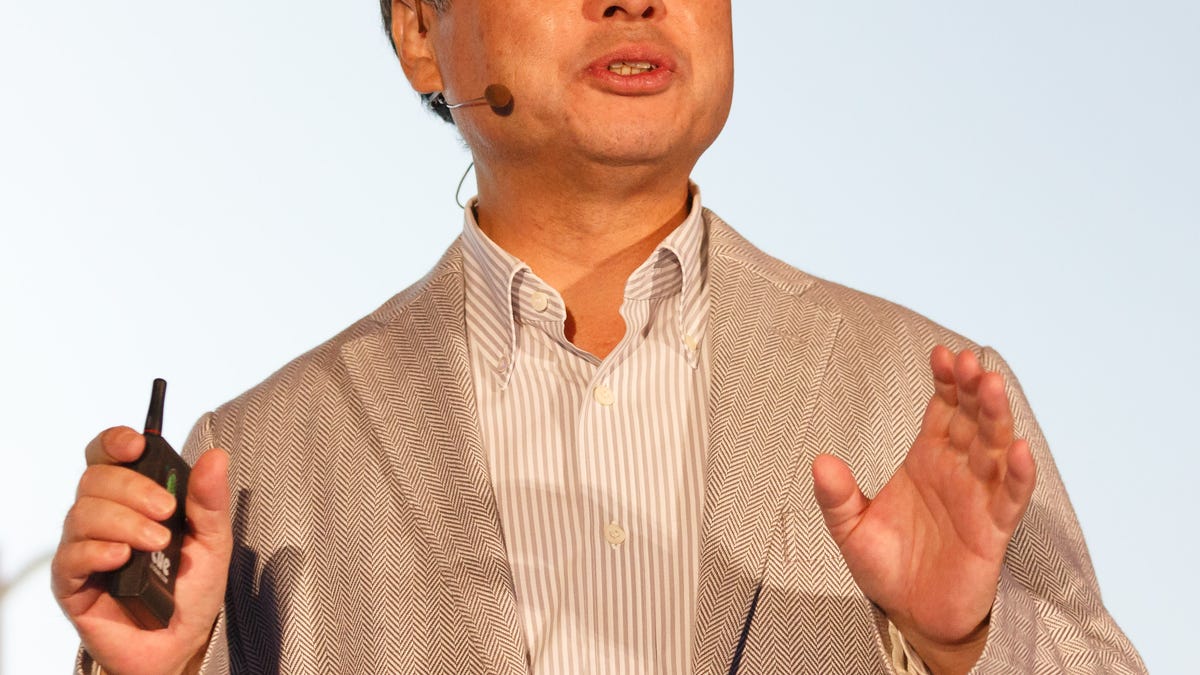Billionaire investor bets AI benefits will outweigh risks
Softbank leader Masayoshi Son expects spreading computing smarts everywhere will improve our lives and even lead to the next step in human evolution.
Masayoshi Son, one of the world's most successful investors, is putting his money behind the artificial intelligence revolution.
Son, the world's 82nd richest man by Forbes' reckoning, leads Softbank, a Japanese telecommunications powerhouse that also holds investments in dozens of companies. The newest in the stable is ARM Holdings, developer of the chip designs that power nearly all phones , which Softbank acquired for $32 billion this year.
Those ARM chips will help spread artificial intelligence and propel the world toward the so-called singularity, Son said, speaking Tuesday at ARM's developer conference here in Santa Clara, California. The singularity is the moment futurists envision when computing progress has accelerated to the point where we no longer can predict what's next for technology or humanity.
A day when superintelligent computers control everything from health care to transportation might terrify you, but it excites Son.
"The singularity, if you misuse it, could be super dangerous. But if you use it in the right way, it will help people live longer, have a more productive life, have more fun, no more accidents on the highway," Son said. Fire and the knife were dangerous discoveries, too, but they dramatically improved human lives, he argued during a meeting with reporters. "I'm always on the brighter side."
Just a few years ago, it might have seemed like he was talking about science fiction, but artificial intelligence technology now is fledging into industry after a decades-long incubation in academic circles. Google, Facebook, Apple , Microsoft and innumerable startups are using the technology to identify what's going on in photos and videos, translate speech and drive cars. Even President Barack Obama is offering opinions on AI.
ARM expects the computing power will only spread from here. "There is no stopping the demand for intelligent silicon," ARM Chief Executive Simon Segars said in a speech at the conference. ARM chips are used in everything from supercomputers to nearly invisible sensors, with more than 200 billion shipped in 2015. Apple and Samsung design their own chips for phones, but they're based on ARM's technology. Under Softbank control, Segars expects to accelerate ARM plans. He said he can bet bigger now since he no longer must deliver steady quarterly results to keep public investors happy.
Of course, spreading computing smarts everywhere -- an idea called the internet of things -- has drawbacks. On Friday, attacks launched in part by internet-of-things devices brought down many high-profile websites on the internet.
Softbank CEO Masayoshi Son predicts a new chapter of human-computer cooperation at ARM TechCon 2016.
Son is worried, too. A modern car has hundreds of chips -- many of them ARM designs, by the way. "It's pretty easy to hack a connected car, because there is basically zero security inside the car," he said.
But the computing devices will come, boosted by his current investments and a new $100 billion technology fund announced this month with the Saudi Arabian public investment fund. He predicted that by 2035, a trillion chips will be in use, feeding data to the computing cloud and where analytics systems will digest the data and use it to serve us better.
"This deep learning will make us super smart," he said. Son likened it to the development of the first eyes, by small creatures called trilobites after the Cambrian explosion of different life forms more than 500 million years ago. "This will jump-start our evolution on the earth."


